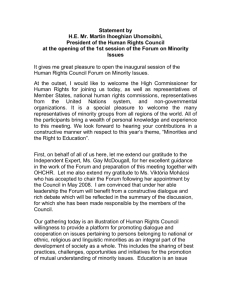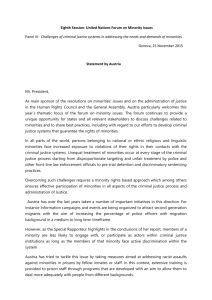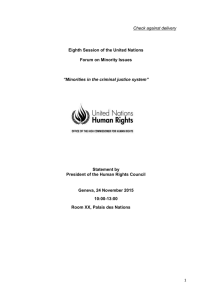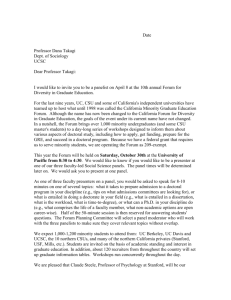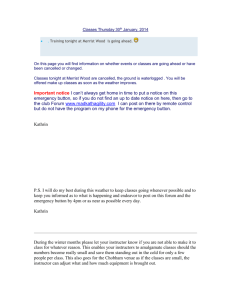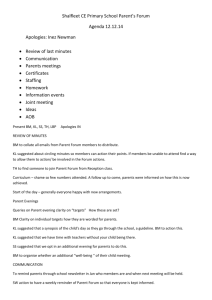Chairperson of the Forum on Minority Issues, Mr Joshua Castellino
advertisement
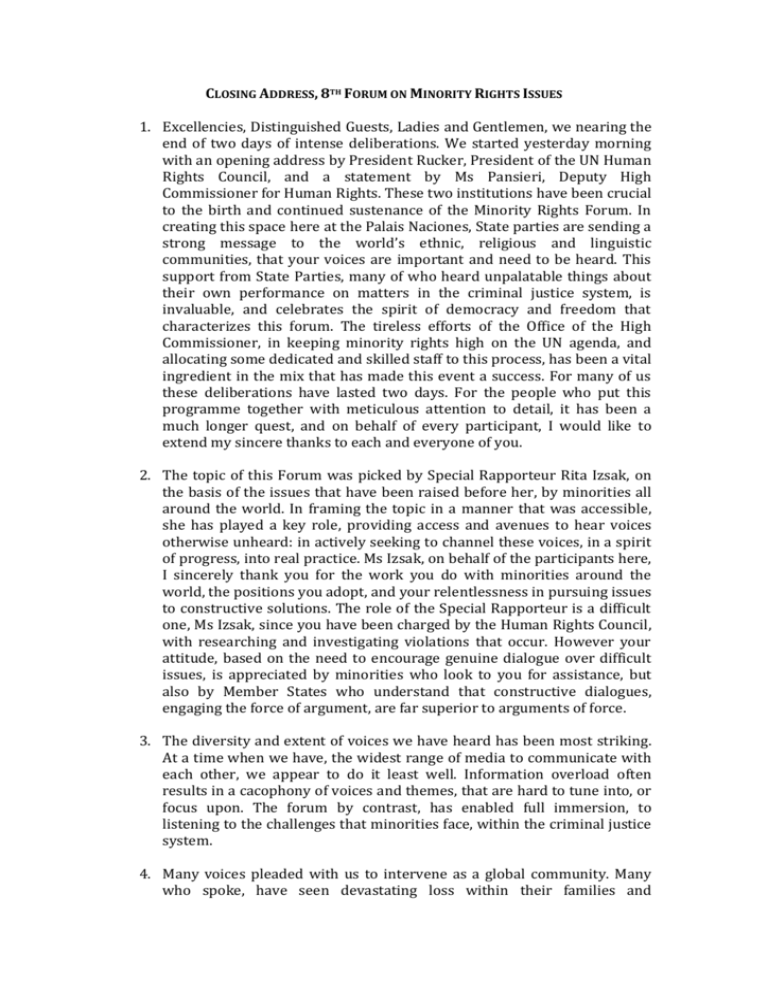
CLOSING ADDRESS, 8TH FORUM ON MINORITY RIGHTS ISSUES 1. Excellencies, Distinguished Guests, Ladies and Gentlemen, we nearing the end of two days of intense deliberations. We started yesterday morning with an opening address by President Rucker, President of the UN Human Rights Council, and a statement by Ms Pansieri, Deputy High Commissioner for Human Rights. These two institutions have been crucial to the birth and continued sustenance of the Minority Rights Forum. In creating this space here at the Palais Naciones, State parties are sending a strong message to the world’s ethnic, religious and linguistic communities, that your voices are important and need to be heard. This support from State Parties, many of who heard unpalatable things about their own performance on matters in the criminal justice system, is invaluable, and celebrates the spirit of democracy and freedom that characterizes this forum. The tireless efforts of the Office of the High Commissioner, in keeping minority rights high on the UN agenda, and allocating some dedicated and skilled staff to this process, has been a vital ingredient in the mix that has made this event a success. For many of us these deliberations have lasted two days. For the people who put this programme together with meticulous attention to detail, it has been a much longer quest, and on behalf of every participant, I would like to extend my sincere thanks to each and everyone of you. 2. The topic of this Forum was picked by Special Rapporteur Rita Izsak, on the basis of the issues that have been raised before her, by minorities all around the world. In framing the topic in a manner that was accessible, she has played a key role, providing access and avenues to hear voices otherwise unheard: in actively seeking to channel these voices, in a spirit of progress, into real practice. Ms Izsak, on behalf of the participants here, I sincerely thank you for the work you do with minorities around the world, the positions you adopt, and your relentlessness in pursuing issues to constructive solutions. The role of the Special Rapporteur is a difficult one, Ms Izsak, since you have been charged by the Human Rights Council, with researching and investigating violations that occur. However your attitude, based on the need to encourage genuine dialogue over difficult issues, is appreciated by minorities who look to you for assistance, but also by Member States who understand that constructive dialogues, engaging the force of argument, are far superior to arguments of force. 3. The diversity and extent of voices we have heard has been most striking. At a time when we have, the widest range of media to communicate with each other, we appear to do it least well. Information overload often results in a cacophony of voices and themes, that are hard to tune into, or focus upon. The forum by contrast, has enabled full immersion, to listening to the challenges that minorities face, within the criminal justice system. 4. Many voices pleaded with us to intervene as a global community. Many who spoke, have seen devastating loss within their families and communities, experienced widespread ethnic cleansing, been part of mass movement of peoples in search of survival, driven out of their homes by violence, grinding poverty or dwindling resources. They highlight how forces of law and order have failed in protecting their dignity and worth, and on occasion, have been complicit in the root causes of these suffering. I add my voice to theirs in calling for a collaborative approach to ensure these violations are stopped, and that security and a return to a just and inclusive order becomes a priority. The police and criminal justice system need to be our allies in this battle and I call upon them to do what they, for the most part, do well: to serve in the interests of creating ordered and just societies. 5. We have heard, from our experts and others, of the plethora of international standards that exist around the world. The solutions to our problems will not be stumbled upon by chance, but rather, need to be painstakingly plotted, with the best design in mind, to ensure that the vast time spent by State parties negotiating these standards, is not wasted as animated rhetoric. 6. We have heard from Member States of the challenges they face. Some have offered insights from their practice, others have offered support for the project of creating more robust and inclusive criminal justice systems. The presence of States throughout the duration of this forum is the best indicator that they too are seeking answers to questions - the first crucial step for any collaborative effort in seeking solutions. 7. The time for talk, at this forum anyway, has nearly ended. Beyond this we must commit to act: to continue to critique society and highlight injustices that exist, but to move beyond, to collaborate and construct the solutions that will give us the societies we want to live in. How can these become reality? 8. Well let’s imagine what a good outcome for this Forum may be. It would include, first, acceptance by stakeholders and society, in the need for significant change. Second, it must include the idea that meaningful change would not be feasible if it did not include all segments of a State’s population. Third, perhaps acceptance that collaborative solutions are more likely to work than isolated ones? That engaging in new or continuing dialogue between State and minority is better than confrontation? That if we re-live old antagonisms and well-worn complaints, we are likely to arrive at the same outcome time and again? 9. If we believe the future will resemble the past, it most likely will. Instead we need to challenge our own assumptions, and put aside our own prejudices, to ensure that the future is a better and significantly more inclusive version of the past. 10. Why is this important? a. Because we all know that injustice exists, and pretending it does not, will not extinguish, but only reiterate it. b. Because we know that societies have inherited deep structural inequalities that are genuinely difficult to break through. c. Because the collective threats we face: random acts of wide-scale violence, rampantly spreading disease, mass migratory patterns, climate change, and the need, amidst it all, to generate growth and employment in an increasingly mechanized world, are far bigger than all of us. Understanding how to cope with this level of uncertainty, the hallmark of progress, requires us to call upon all of our lived experiences, and not only those of a few. 11. Excellencies, Distinguished Guests, Ladies and Gentlemen, it has been an immense privilege to share and chair this experience alongside you. I trust that I have done the duty entrusted to me in a manner that is fair, and that has encouraged dialogue, and I thank you for the manner and efficacy in which you have conducted these proceedings. This augurs well for the commencement of subsequent collaborative efforts to ensure that the criminal justice systems of the future will be significantly better and more inclusive than those of the past. So I end by with a simple question: Are you up for this challenge?
